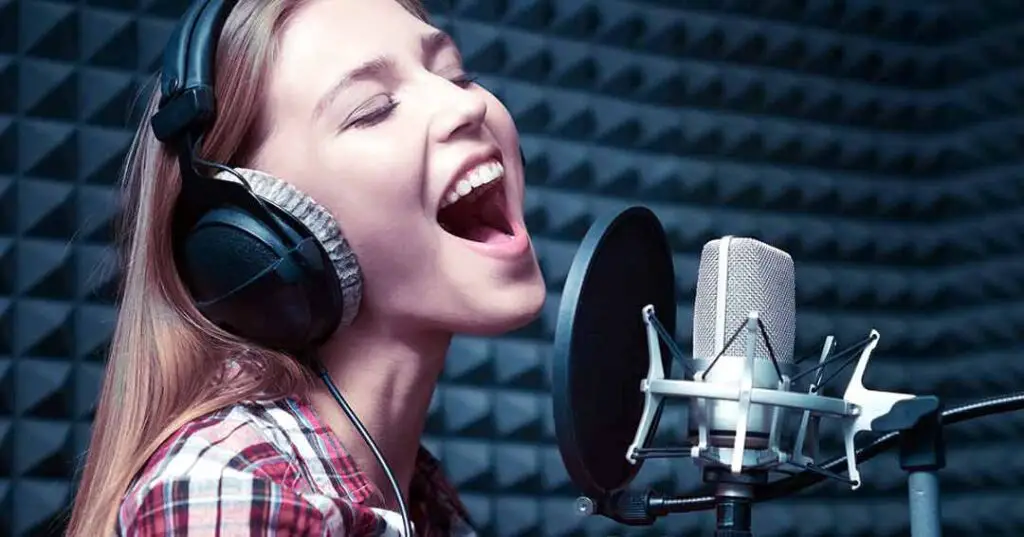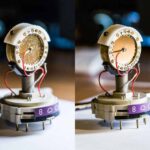Are condenser mics good for singing?: Condenser mics are good for singing because they capture a wider range of frequencies than dynamic mics, which makes them great for capturing the nuances of a singer’s voice. They are also more sensitive than dynamic mics, so they can pick up softer sounds like breath and vibrato. However, condenser mics are more expensive than dynamic mics and require phantom power to operate, so they may not be the best choice for everyone.
Condenser microphones are often thought of as the best type of microphone for singing. This is because they are able to capture all the nuances and subtleties in a singer’s voice. They are also very sensitive, so they can pick up even the softest sounds.
However, condenser microphones can also be quite delicate. They need to be handled with care, and they can be easily damaged if they are dropped or mishandled. Additionally, they tend to be more expensive than other types of microphones.
If you are looking for a microphone that will give you the best possible sound quality for your singing voice, then a condenser microphone is definitely worth considering. However, keep in mind that they require a bit more care and attention than other types of microphones.
Also Read: Best Condenser Mic Under 200
Table of Contents
Condenser Microphone
Microphones are an essential part of any audio setup, whether you’re recording in a studio or performing live. There are many different types of microphones available, each with its own strengths and weaknesses. One type of microphone that is often used for recording is the condenser microphone.
Condenser microphones are characterized by their higher sensitivity and ability to capture more detail than other types of microphones. This makes them ideal for capturing delicate sounds like acoustic guitars or vocals.
However, because they are so sensitive, they can also pick up unwanted noise like room ambiance or computer fans.
If you’re looking for a microphone to use for recording, a condenser microphone may be a good option for you. Just be sure to take into account the pros and cons before making your decision.
Also Read: Best affordable condenser mics for vocals

Can You Use Condenser Mic for Singing?
There are a few things to consider when deciding if you can use a condenser mic for singing.
The first is the price point – condenser mics are generally more expensive than dynamic mics, so if you’re on a budget, it may not be the best option.
Additionally, condenser mics require phantom power to operate, so you’ll need to make sure your audio interface or mixer has this feature.
Finally, while many singers enjoy the clear, detailed sound of a condenser mic, some find it to be too “bright” or “harsh” sounding for their voice. If you’re unsure which type of mic is right for you, we recommend trying out both types before making a purchase.
Are Condenser Or Dynamic Mics Better for Singing?
Are condenser or dynamic mics better for singing? It really depends on the situation. If you’re in a studio and can control the environment, then a condenser mic is probably your best bet.
They tend to have a more accurate sound, and they pick up subtle nuances in your voice that a dynamic mic might miss.
However, if you’re performing live, a dynamic mic is probably a better choice. They’re more rugged and can handle higher levels of sound without distortion.
Are Condensers Good for Singing?
When it comes to singing, there is a lot of debate over whether or not condensers are actually any good. While some say that they can help you produce a better sound, others claim that they can actually do more harm than good. So, what is the truth?
Are condensers really good for singing? The answer may surprise you. While condensers can certainly help you produce a better sound, they can also cause problems if not used correctly.
In general, it is best to avoid using condensers when possible, as they can often lead to a loss of vocal quality. However, if you absolutely need to use one, be sure to follow these tips:
– Use the right type of microphone.
Not all microphones are created equal. Some are designed specifically for vocals while others are better suited for instruments. Be sure to use a microphone that is designed for vocals in order to get the best results.
– Choose the right setting.
Depending on the type of music you’re singing, you’ll want to adjust the settings on your condenser accordingly. For example, if you’re singing classical music, you’ll want to use a different setting than if you’re belting out rock songs.
– Don’t overdo it.
Just because you have a condenser doesn’t mean you need to use it all the time. In fact, too much processing can actually ruin your voice instead of helping it sounded its best.
Use moderation and only employ the condenser when absolutely necessary.
What are the Disadvantages of the Condenser Mic?
There are a few disadvantages to using a condenser microphone as opposed to other types of microphones. One disadvantage is that condenser microphones are generally more expensive than other types of microphones.
Another disadvantage is that they require Phantom power, which means an extra power source is needed in order to use the microphone.
Additionally, because they are more sensitive than other types of microphones, they can pick up unwanted background noise more easily.
Finally, condenser microphones can be less durable than some other types of microphones and so may need to be handled with care.
Dynamic vs Condenser Mics | Sound Engineering Workshop
Conclusion
Condenser mics are often thought of as being better for singing than dynamic mics, but that isn’t necessarily the case. Both types of microphones have their own strengths and weaknesses, so it really depends on what you’re looking for in a microphone. If you need a mic that will capture all the nuances of your voice, then a condenser mic is probably a better choice.
However, if you’re looking for a mic that can handle more volume without distortion, then a dynamic mic might be a better option. Ultimately, it’s up to you to decide which type of microphone is best for your needs.
Relevant Post:
Are Condenser Mics Good for Streaming?
Are condenser mics good for podcasts?
Why is My Condenser Mic Not Working?
How to Connect Condenser Mic to Bluetooth Speaker?
How to Connect Condenser Mic to Mac?
How to Connect Condenser Mic to Speaker?
How to Connect a Condenser Mic to a Pc?
Are you a user of a condenser mic?
Does a condenser mic need phantom power?
How to use condenser mic on tiktok?
Can you record guitar with a condenser mic?

Williams Kane is a blogger and writer. He’s passionate about writing and connecting with the community, especially when it comes to sharing his ideas through writing.
I am a versatile author with a passion for exploring a wide range of topics on our multi-niche website. With a background in research and a love for writing, I bring a unique blend of expertise to our platform.
My journey began in the world of science, where I earned a degree in biology and developed a deep fascination for the natural world. This background enables me to delve into topics related to ecology, environmental conservation, and the wonders of the animal kingdom.
However, my curiosity knows no bounds, and I have ventured into various other niches as well. From technology trends and digital innovations to health and wellness tips, I strive to provide well-researched and engaging content that informs and entertains our diverse audience.
Furthermore, my dedication to staying current with the latest developments in each niche ensures that our readers receive up-to-date and reliable information. Whether it’s deciphering complex scientific concepts or simplifying tech jargon, I take pride in making complex subjects accessible to all.
Join me on our multi-niche journey, where we explore the depths of knowledge and share insights on a multitude of topics to inspire, educate, and entertain.




